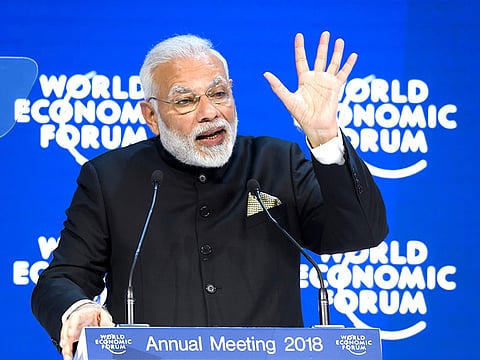India’s Modi defends open trade despite globalisation’s waning allure
India should serve as an example as it opens up to foreign investment

DAVOS
Indian Prime Minister Narendra Modi acknowledged on Tuesday that globalisation is “losing its lustre” but warned that new trade walls are not the answer, opening a week of Davos meetings that will climax with a speech by the loudly protectionist US President Donald Trump.
After spectacular snowfall that stranded some high-flying delegates on their way to the Swiss ski resort, the World Economic Forum started in earnest basking in robust global growth but facing warnings that the world’s have-nots are missing out more than ever.
Modi told the forum that India should serve as an example as it opens up to foreign investment, in a speech that delved into Indian scripture and had strong echoes of an anti-protectionist clarion call issued in Davos a year ago by Chinese President Xi Jinping as Trump prepared to take office.
“It feels like the opposite of globalisation is happening. The negative impact of this kind of mindset and the wrong priorities cannot be considered less dangerous than climate change or terrorism,” Modi said, staging the first appearance at Davos by an Indian prime minister since 1997.
“In fact everyone is talking about an interconnected world but we will have to accept the fact that globalisation is slowly losing its lustre,” he said.
“The solution to this worrisome situation is not isolationism. Its solution is understanding and accepting change and formulating agile and flexible policies for these changing times.”
Trump came to office on a populist platform that demonised the globalist Davos elite. While some delegates are relieved that full-blown trade wars with the likes of China have yet to erupt, the president served a fresh reminder that his rhetoric has teeth.
Trump on Monday approved steep tariffs on imports of solar panels and washing machines to protect US producers, triggering an outcry in China and South Korea.
However in Davos, Modi channelled the founding father of independent India, Mohandas Gandhi, who he said had argued that “I don’t want the walls and windows of my house to be closed from all directions.
“I want that the winds of cultures of all countries enter my house with aplomb and go out also. However I will not accept my feet to be uprooted by these winds.”
That was redolent of Xi last year, who wowed the Davos crowd by warning that pursuing protectionism “is like locking oneself in a dark room”.
“Wind and rain may be kept outside, but so is light and air.”
Modi, touting India’s growing appeal to foreign investors and his Hindu-nationalist government’s campaign to promote technology, said the country took Gandhi’s thinking on board entirely.
“With complete self-confidence and fearlessness, India is welcoming this wave from all over the world,” he said.
Despite its impressive growth under the Modi government, India displays some of the world’s worst extremes of the rich-poor divide, an issue exercising the 70-odd leaders and thousands of delegates engaging in the week of debate high in the Swiss Alps.
Undermining rosy data on the world economy are warnings that elite forums such as Davos must start finding solutions for everyone else down the income ladder as the “one per cent” amass untold riches a decade since a major financial crisis erupted.
“We certainly should feel encouraged, but we should not feel satisfied,” International Monetary Fund (IMF) chief Christine Lagarde said on Monday, presenting an upbeat update to the organisation’s forecasts for global growth.
“First of all, there are still too many people left out from the recovery and acceleration of growth,” she said.
In a separate report unveiled in Davos, Oxfam said the world’s richest one per cent raked in 82 per cent of the wealth created last year while the poorest half of the population received none.
“Our report shows that inequality is out of control globally. It shows our broken economies are rewarding wealth and not hard work,” Oxfam executive director Winnie Byanyima told AFP on Tuesday.
In his own message to the Davos forum, Pope Francis warned that debates about technological progress and economic growth must not supplant concern for humanity at large.
“We cannot remain silent in the face of the suffering of millions of people whose dignity is wounded,” the pontiff’s message said.



